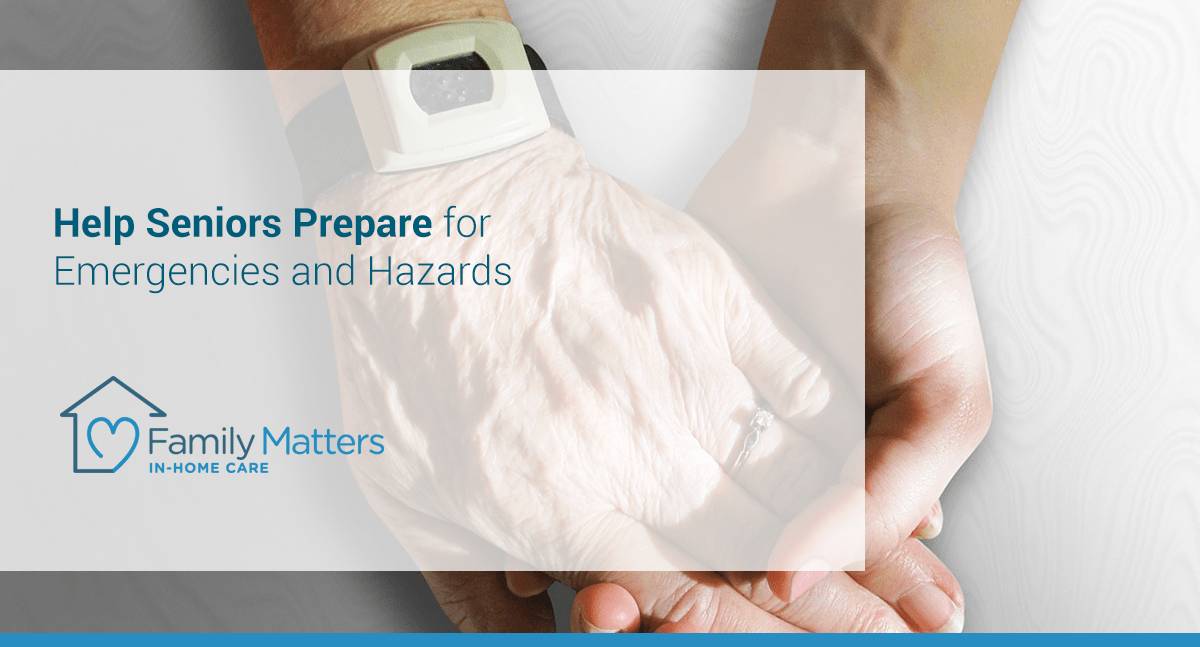
Help Seniors Prepare for Emergencies and Hazards
In emergency situations, seniors are often less able than other adults to protect themselves. For example, older adults are 2.5 times more likely to die in fires than the general population. Preparing for emergencies can help keep seniors safe when hazards arise.
Safety is one of the major concerns of most seniors and their family members when older adults live in their own homes. The concern is valid; injury is the cause of 1 in 40 deaths in America.
Safety Tips and Technology
Often, improving senior home safety involves making minor adaptations or additions. Use this checklist to minimize risks in the home:
- Add supports to chairs, walls, bathroom fixtures, etc.
- Use brighter bulbs and add more lighting
- Remove loose rugs and other tripping hazards
- Find light switches with built-in night lights
- Get devices like life-alert buttons that seniors can wear
- Set loud alarms on stoves, cell phones, and other appliances when they are turned on for a long time or need to be recharged
- Create a plan for regular check-ins by friends or family
- Keep poisons and chemicals in a secure place away from edible items
- Schedule regular checks on fire alarms, carbon monoxide detectors, and other alert systems
- Update ventilation to prevent smoke, mold, and other hazardous build-up
- Remove clutter and arrange furniture for easy navigation
- Run cords and other tripping hazards along walls or out of the way
How to Build an Emergency Kit
Besides common home hazards, seniors are also at an elevated risk when emergencies like fires or natural disasters occur. This can be due to factors such as dulled senses and health conditions like memory loss or limited mobility.
Build an emergency kit to protect seniors. Be sure to make the kit something seniors can grab and take with them quickly if necessary. Include:
- Emergency numbers like poison control
- Personal emergency contact numbers
- A limited supply of essential medications
- Copies of insurance/vital documents
- Spare keys to the home, car, etc.
- One basic outfit
- Water or filtered water bottle
It’s also wise to create a second, similar kit for loved ones to use in case a senior experiences an emergency. Close friends, family members, or caregivers should be told where to locate the kit. For older adults living in areas particularly prone to natural disasters, this second kit should be stored elsewhere, like with a family member.
Common Home Hazards for Seniors
For many seniors, illnesses and natural processes of aging can be threatening. Seniors living in their own homes face additional threats in the form of home hazards. Some medical conditions, like dementia, can make these hazards even more risky. Common hazards in the home include:
- Throw rugs or steep stairs that could cause falls
- Poison for pests or chemicals in cleaning supplies
- Carbon monoxide
- Fire
- Choking
- Sharp objects that are not secured
- Stoves and other hot devices
Conditions That Make Seniors More Vulnerable
Extra precautions and preparedness are important for seniors who are more vulnerable than others. For instance, the following conditions increase vulnerability:
- Memory-related health problems
- Chronic fatigue or poor sleeping habits
- Living in areas prone to natural disasters
- Experiencing poverty
- Limited mobility
- Multi-level homes
- Dulled senses like reduced hearing, eyesight, or sense of smell
If you or your family member is considering in-home care as part of a plan to age in place, contact Family Matters In-Home Care today for a free consultation. Our team is dedicated to supporting your family and helping older adults enjoy life in the comfort of their own home for as long as possible.
Some of the services offered by Family Matter In-Home Care include: Alzheimer’s & Dementia Care, Bed & Wheelchair Transfer Assistance, Companionship, Housekeeping & Meal Preparation, Personal Care, Recovery Care, and Transportation.
Serving the San Francisco Bay Area and Greater San Diego, Family Matter In-Home Care has offices throughout California including: Campbell, CA, Roseville, CA, San Marcos, CA, and San Mateo, CA.
Sources:
- https://cdn2.hubspot.net/hubfs/1708580/Marketing%20Monthlies/PDFs%20from%20Windfarm%20Marketing/0619-EmergencyPreparedness-RGB.pdf
- https://www.usfa.fema.gov/downloads/pdf/statistics/fa-300.pdf
- https://healthfinder.gov/NHO/JuneToolkit2.aspx
- https://www.aarp.org/home-garden/home-improvement/info-05-2010/no-cost-low-cost-home-improvements.html
- https://www.redcross.org/get-help/how-to-prepare-for-emergencies/seniors.html
- https://staysafe.org/safety-at-home-10-common-safety-hazards-around-the-house/
